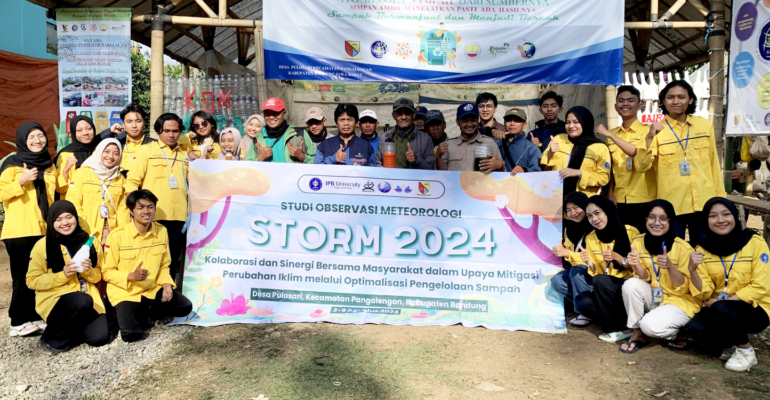Caring for the Environment to Reduce Pollution, Himagreto IPB University and Pulosari Villagers Make Vegetable Pesticides

The Agrometeorology Professional Student Association (Himagreto), Department of Geophysics and Meteorology (GFM) IPB University organised training in making organic-based vegetable pesticides in Pulosari Village, Pangalengan District, Bandung Regency, West Java. This training was carried out as part of a series of Meteorological Observation Study (STORM) 2024 activities.
The training on making vegetable pesticides aims to answer the problem of the high use of chemical pesticides which have an impact on long-term soil damage. Most Pulosari villagers work as vegetable farmers, so the area is known for its abundant production of vegetable crops.
“Training like this is very suitable to be applied in our village. We will always consider this knowledge as one of the benefits, considering Pulosari Village is one of the vegetable producing villages. Long-term environmental damage caused by chemical pesticides can be repaired by using vegetable pesticides that are more environmentally friendly. The ingredients are also quite easy to obtain at a more affordable price as well,” explained Herman, one of the villagers.
Herman revealed that this training has a high chance of being used in Pulosari Village. According to him, plant-based pesticides can be a good combination to deal with pests and diseases without any damage to the environment. From an economic perspective, vegetable pesticides also tend to be cheaper and easier to obtain.
The training began with the delivery of material on various types of pests and diseases, an explanation of the ingredients that can be used as vegetable pesticides, then continued with practice with the community who attended the training. The training ended with a discussion session that was responded to very enthusiastically by Pulosari villagers.
Alvin, one of the organisers of the activity, said that this training was a form of IPB University students’ concern for the environment and protecting the farming activities of Pulosari villagers from the impact of soil nutrient damage due to the massive use of chemical pesticides. He also expressed his gratitude to Pulosari villagers for their high curiosity in participating in this training.
“We are grateful for the high curiosity of the residents in participating in this vegetable pesticide training. The enthusiasm in discussing and sharing experiences while farming also became new knowledge for me. I hope that the activity of making vegetable pesticides can be of value and continue to be applied by the community. Pulosari Village’s vegetable productivity can be maintained and last long into the future if we also care about the planting media,” he said. (*/Rz) (IAAS/RSL)



